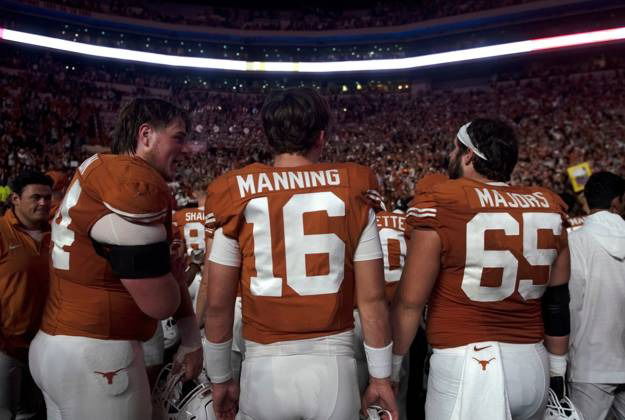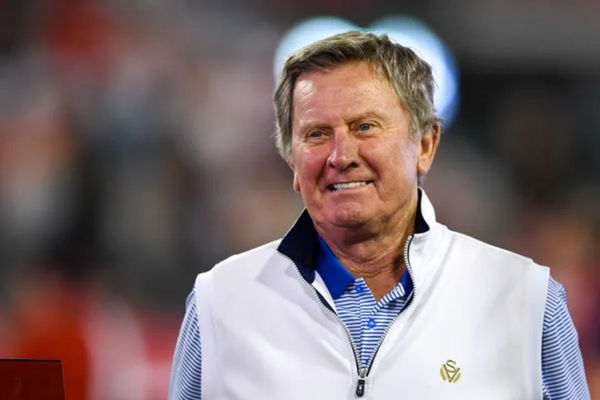

Arch Mania came to a screeching halt on Saturday afternoon. The season debut of ‘Austin’s prince’ Arch Manning did not go to plan, as No. 1 Texas Longhorns dropped the opener to No. 3 Ohio State at 14-7. Now Manning and head coach Steve Sarkisian are feeling the repercussions of the wave of disappointment they have spread among the Texas fans. And while fans were quick to dissect the five-star’s stat line, one SEC legend turned his attention to something deeper—how Sarkisian handled his young QBs in the fire.
Watch What’s Trending Now!
Florida’s legendary head coach Steve Spurrier didn’t hold back when asked about Texas’ game plan and sideline approach. Based on what the FOX broadcast showed, Spurrier wanted more communication between the two, especially as Manning struggled. “I don’t like their game plan,” Coach Spurrier said via Another Dooley Noted Podcast. “And I don’t really like how they do it. When I coach, everybody knows I coach the quarterback and call the plays. So in between, I go there and sit on the bench with him if something happened. ‘Look at this, look at that.’ So, I talk to him during the game.”
Spurrier zeroed in on the lack of dialogue between Sarkisian and Manning during those critical moments when the offense sputtered. “Arch, I don’t think anybody was talking with him. He goes and sits with his teammates over there. Put a headset on, talk to the guy up top, or somebody. But there was no communication, no ‘Come on now, you’re going to be alright.’ They just sort of left him out there, and it didn’t work out very well for their offense.” Coming from a man who built his reputation by developing QBs into polished point guards of the gridiron, that critique stings. Spurrier’s sideline philosophy was rooted in immediate feedback, teaching in real time. For a debutante like Manning, Spurrier believes that silence was a missed opportunity.
The film only further complicated matters. Pat Dooley, watching from his analyst’s lens, saw a QB caught between new coaching expectations and old habits. He noted Sarkisian seemed to be treating Arch like a veteran starter instead of a “new QB” who still needed the training wheels. Arch Manning, to his credit, looked more polished than he did in 2024, but the fundamentals betrayed him. His slinging mechanics and awkward body posture on release were glaring. On the interception, for example, his front knee was locked vertically while his torso leaned mid-throw—an imbalance that bled velocity from the ball and allowed the cornerback to undercut it. These are small details, but in the SEC, small details decide games.

Statistically, the afternoon was forgettable, with flashes of what could be. Manning finished 17 of 30 for 170 yards, one touchdown, and that costly interception. Most of the production came late, in catch-up mode, when the Ohio State defense softened. There were moments when the ball came out with zip, when his eyes scanned quickly, when he looked like the quarterback Texas sold to the world as its next Heisman candidate. But the early-game struggles exposed just how much development is still required. In football terms, his platform wasn’t stable, his timing was inconsistent, and the ball placement lacked the precision needed against elite secondaries.
Texas, of course, still has faith that the Manning name will eventually come paired with accolades in burnt orange. The schedule at least provides some runway. San Jose State comes next, a tune-up opportunity where Sarkisian can emphasize mechanics and, perhaps, heed Spurrier’s advice about communication.
The real test looms on October 4 against Florida—Spurrier’s old stomping ground—where the stakes will multiply and every throw will be dissected under a brighter spotlight. Beyond that? Seven SEC games that will demand a steeper learning curve, not just for Manning, but for Sarkisian’s approach as a quarterback whisperer.
“If he was this good…”: Legends question why Arch Manning never replaced Quinn Ewers
If Saturday’s flop against Ohio State wasn’t enough heat for Arch Manning, the conversation only turned up another notch when folks circled back to last season. The point? If Manning is the generational talent we’ve all been sold, why didn’t he wrestle the job away from Quinn Ewers before things spiraled? It’s a fair question.
“People picking Texas to win the SEC in football,” Spurrier said. “They’ve got Arch Manning already winning the Heisman, too. And my question is, if he was this good, how come they let Quinn Ewers play all the time last year?” That cut to the heart of it. The Longhorns had Manning waiting, but Ewers—injury-plagued and inconsistent—kept the keys. Now, with Ewers sliding all the way to the seventh round of the NFL Draft, the hindsight microscope is glaring.
This is basically the same point former Georgia QB Aaron Murray made a month ago on SiriusXM, and he didn’t mince words either. “So all in all, Quinn Ewers had a disappointing season, and it reflected in his draft stock,” Murray said. “If you are so good and everyone has you projected number one pick in the NFL Draft, come 2026, why in the h–l are you not playing above a seventh-round quarterback?”
The logic stings. Sure, Sarkisian trusted experience, but even Murray wondered if that loyalty handcuffed Texas. “If Steve Sarkisian knows what he’s doing and he knows how good their roster is, which I’ve talked to a lot of coaches and a lot of different teams and I asked them, like, what are the top rosters? Ohio State, Texas, probably Georgia. Once again, though, coaches will usually give the more experienced quarterback the benefit of the doubt.” That’s the rub. Manning’s ceiling is obvious, but the patience act wore thin.
.png)
.png)
.png)





